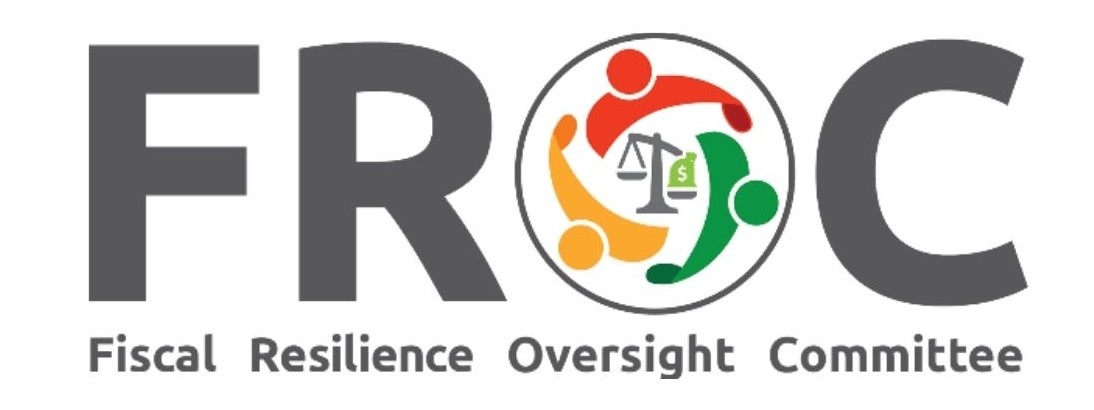
The Fiscal Resilience Act Origin & Objectives
The Fiscal Resilience Act No. 11 of 2023 replaced the repealed Fiscal Responsibility Act No. 29 of 2015 which operated from 2016 to 2023. The Fiscal Responsibility Act was an important component of a package of financial legislation during a period marked by the restructuring of public debt and the implementation of the Structural Adjustment Programme. The main objective of the financial legislation was to ensure the pursuit of transparent, accountable, and sustainable fiscal policy.
The Fiscal Responsibility Act, in Sections 7 and 8, specified fiscal rules and targets to guide the conduct of fiscal policy as follows:
i. the rate of growth of the primary expenditure of the Central Government, and of every covered public entity, shall not exceed two percent in real terms in any fiscal year, when adjusted by the preceding year’s inflation rate;
ii. the ratio of expenditure on the wage bill shall not exceed nine percent to GDP;
iii. the total stock of public sector debt from domestic or external sources for any purpose shall not exceed fifty-five percent of GDP;
iv. contingent liabilities arising from, as a result of, or in connection with public-private partnerships shall not exceed five percent of GDP; and
v. Where the ratio of public debt to GDP for the preceding year reaches fifty-five percent, the targeted primary balance shall be a minimum of three-point five percent of GDP.
Where in a fiscal year the debt level exceeds sixty percent of GDP, appropriate corrective revenue and expenditure measures are expected to be undertaken to reduce the public debt to fifty-five percent of GDP over a period of three fiscal years, with at least one-third of the adjustment in the first year.
From Fiscal Responsibility to Fiscal Resilience
The Fiscal Resilience Act was effective from 1st January 2024. The Fiscal Resilience Act does away with the notion of fiscal responsibility and substitutes the concept of fiscal resilience. This demonstrates a refocus on shoring up the fiscal regime for long term sustainability and improved capacity to withstand economic shocks.
In the Fiscal Resilience Act, the provisions are provided with clarity which allows for ease of implementation, and for monitoring and reporting on compliance of the Government with the Act.
The Fiscal Resilience Act, with a lower required minimum primary balance of 1.5 per cent of GDP, a higher wage bill cap of 13 per cent of GDP and a debt to GDP ratio of 60 per cent to be achieved by 2035, provides flexibility for the Government to manage the economy with the use of fiscal policy.
Members of the FROC

First Chairman of the FROC 2016 – 2020
Mr. Richard Duncan OVE
Mr. Richard Duncan has expertise as an Accountant and Economist. He served as the Accountant General for the Government of Grenada. Thereafter, Mr. Duncan was employed as the Manager, Finance and Corporate Affairs at the Grenada Cooperative Bank and was elevated to the position of Managing Director of the Bank. During his stewardship at the Grenada Cooperative Bank, Mr. Duncan was instrumental in restructuring the Bank, improving its operation and strengthening technical capacity. Mr. Duncan holds a Bachelor of Science (B/Sc) in Economics and Accounting from the University of the west Indies and a Master of Arts (M.A) from Carleton University. Mr. Duncan is a Fellow of the Certified General Accountants Association. (FCGA).

Second Chairman of FROC 2020 - 2022
Dr. Angus Friday
Dr. Friday worked internationally on island economies through the Waitt Institute, served at the World Bank and is Grenada's former Ambassador to the United Nations, the United States and the OAS. He holds a Masters degree in Business Administration (MBA) and a medical doctorate from St. George's University. First Secretary to the FROC: 2016 - 2022.

Third Chairman of FROC 2022 - Present
Ms. Laurel Bain
Ms. Laurel Bain is a former employee of the Eastern Caribbean Central Bank (ECCB) where she served in various positions, including that of Deputy Director in the Research Department, Senior Director of the Statistics Department and Senior Director in the Governor’s Office. Ms. Bain has undertaken economic assessments of countries and considerable research on fiscal policy and tax structures. She has worked extensively with the countries of the Eastern Caribbean Currency Union, regional institutions, and international organisations and development agencies. During her career at the ECCB, Ms. Bain received the Governor’s Award on two occasions for excellent and dedicated service. Ms. Bain has published books on fiscal policy and articles on economic and fiscal policy issues in Grenada in the Budget Alert book series. Ms. Bain is an accredited Director and served as Deputy Chair of the Grenada Authority for the Regulation of Financial Institutions, and as a Director of the Montserrat Financial Services Commission. Ms. Bain holds a Bachelor of Science (B.Sc.) and Masters of Science (M.Sc.) degrees in Economics from the University of the West Indies, Trinidad and Tobago.

First Secretary to the FROC: 2016 - 2022
Mrs. Michelle Millet
Mrs. Michelle Millet is a Chartered Accountant and an Assurance Partner at PKF- Accountants and Business Advisers.
Members of the FROC for each of the Annual Report
FROC 2016 Annual Report
FROC Members
- Mr. Richard W. Duncan: Chairperson, Accountant and Economist
- Ms. Zanna Barnard: Economist
- Ms. Sabina Gibbs: Attorney-at-Law
- Mr. Adrian Hayes: Retired Public Administrator
- Mr. Angus Smith: Retired Accountant
Corporate Secretary to the FROC :
- Mrs. Michelle Millet: Secretary to the FROC, Assurance Partner – Certified General Accountant (CGA)
FROC 2017 Annual Report
FROC Members
- Mr. Richard W. Duncan: Chairperson, Accountant and Economist
- Ms. Zanna Barnard: Economist
- Ms. Sabina Gibbs: Attorney-at-Law
- Mr. Adrian Hayes: Retired Public Administrator
- Mr. Angus Smith: Retired Accountant
Corporate Secretary to the FROC :
- Mrs. Michelle Millet: Secretary to the FROC, Assurance Partner – Certified General Accountant (CGA)
FROC 2018 Annual Report
FROC Members
- Mr. Richard W. Duncan: Chairperson, Accountant and Economist
- Ms. Zanna Barnard: Economist
- Ms. Sabina Gibbs: Attorney-at-Law
- Mr. Adrian Hayes: Retired Public Administrator
- Mr. Angus Smith: Retired Accountant
Corporate Secretary to the FROC :
- Mrs. Michelle Millet: Secretary to the FROC, Assurance Partner – Certified General Accountant (CGA)
FROC 2019 Annual Report
FROC Members
- Mr. Richard W. Duncan: Chairperson, Accountant and Economist
- Mr. Anthony MacLeish: Business Manager and Accountant
- Ms. Shadel Nyack Compton: Attorney-at-Law
- Ms. Zanna Barnard: Economist
- Mr. Philbert Charles: Retired Public Administrator
Corporate Secretary to the FROC :
- Mrs. Michelle Millet: Secretary to the FROC, Assurance Partner – Certified General Accountant (CGA)
FROC 2020 Annual Report
FROC Members
- Dr. E. Angus Friday: Chairman with a Master’s Degree in Business Administration (MBA) and a medical doctorate from St. George’s University
- Ms. Zanna Barnard: Economist
- Mr. Anthony MacLeish: Business Manager and Accountant
- Ms. Shadel Nyack Compton: Attorney-at-Law
- Mrs. S. Sally Anne Bagwhan logie: Public Administration
Corporate Secretary to the FROC :
- Mrs. Michelle Millet: Secretary to the FROC, Assurance Partner – Certified General Accountant (CGA)
Technical Support to the FROC :
- Mr. Angus Smith, Consultant, Retired Accountant
FROC 2021 Annual Report
FROC Members
- Dr. E. Angus Friday: Chairman with a Master’s Degree in Business Administration (MBA) and a medical doctorate from St. George’s University
- Mr. Leon Bullen: Economist
- Mrs. S. Sally Anne Bagwhan Logie: Public Administration
- Ms. Kim George: Attorney-at Law
- Mr. Kippling Charles: Accountant
Corporate Secretary to the FROC :
- Mrs. Michelle Millet: Secretary to the FROC, Assurance Partner – Certified General Accountant (CGA)
Technical Support to the FROC :
- Mr. Angus Smith, Consultant, Retired Accountant
FROC 2022 Annual Report
FROC Members
- Ms. Laurel Bain: Chairwoman, Economist
- Ms. Annette Henry: Attorney-at -Law and Public Administration
- Mr. Leon Bullen: Economist
- Ms. Kim George: Attorney-at-Law
- Mr. Kippling Charles: Accountant
Corporate Secretary to the FROC :
- Mrs. Michelle Millet: Secretary to the FROC, Assurance Partner – Certified General Accountant (CGA
Technical Support to the FROC:
- Dr Juliet A. Melville: Consultant, Economist with a BSc. and MSc. in Economics from UWI and a Ph.D. in Economics from the University of Kent.
FROC 2023 Annual Report
FROC Members
- Ms. Laurel Bain: Chairwoman, Economist
- Ms. Annette Henry: Attorney-at-Law and Public Administration
- Mr. Leon Bullen: Economist
- Mrs. Lisa Taylor: Attorney-at-Law
- Mr. Randy Lewis: Accountant
Technical and Administrative Manager of the FROC:
- Mrs. Afia Joseph- Zufelt: Technical and Administrative Manager with expertise in finance and strategic planning. She holds a BSc. in Accounting and an MBA in International Business Administration from St. George's University.
Technical Support to the FROC:
- Dr. Juliet A. Melville: Consultant, with a BSc. and MSc. in Economics from UWI and a Ph.D. in Economics from the University of Kent.
FROC 2024 Annual Report
FROC Members
- Ms. Laurel Bain: Chairwoman, Economist
- Ms. Annette Henry: Attorney-at -Law and Public Administration
- Mr. Leon Bullen: Economist
- Mrs. Lisa Taylor: Attorney-at-Law
- Mr. Hyacinth Jeremiah: Accountant
Technical and Administrative Manager of the FROC:
- Mrs. Tracy Victor: Technical and Administrative Manager with expertise in financial planning, debt management and organizational development. She holds a BSc in Business Administration and postgraduate training in Financial Planning, Financial Services and Project Management.
Technical Support to the FROC:
- Dr. Juliet A. Melville: Consultant, with a BSc. and MSc. in Economics from UWI and a Ph.D. in Economics from the University of Kent.

Contact Info
St. George Grenada.
Monday ,Wednesday and Friday.9:00 am–1:00 pm
Useful Links
Newsletter
Stay updated with the latest from FROC by subscribing to our newsletter! .

